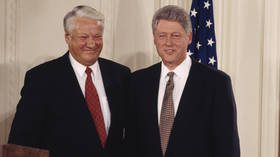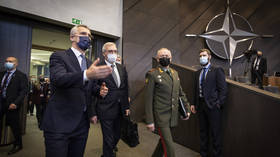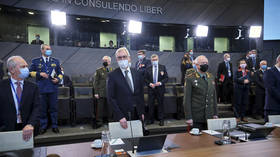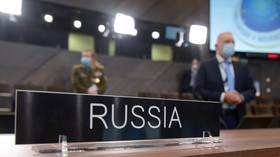Russia is right: The West promised not to enlarge NATO & these promises were broken

With Russia challenging Western unilateralism in a way not seen since the end of the Soviet Union, two major issues keep coming to the fore. Both, it seems, are centered on America's flagship military bloc, NATO.
First, there is Moscow’s claim that there was a Western promise not to expand NATO beyond its Cold War area. Second, there is a Western claim that NATO cannot, let alone will not, put an end to admitting new member states.
This is no mere rhetoric; these are crucial points. Russia’s insistence on a thorough review and comprehensive, bindingly codified reset of post-Cold War security relations with the West hinges on its claim that prior Western assurances were broken. Talk and informal promises, the Kremlin says, are not enough anymore because they have turned out to be unreliable. On the other side of the quarrel, the West is rejecting a Russian key demand – to stop NATO expansion – by entrenching itself behind its claim that NATO simply must keep the door open to new members.
Both claims can be verified. Let’s take a look at the facts. Moscow is right in its assertion that the West has broken its promises.
Such pledges were made twice to Russia, as a matter of fact. In 1990, during the negotiations over the unification of West and East Germany, and then, again, in 1993, when NATO was extending its Partnership for Peace policy eastward. In both cases, the assurances were given by US secretaries of state, James Baker and Warren Christopher, respectively. And in both cases, they took it upon themselves to speak, in effect, for NATO as a whole.
Despite clear evidence, there are still Western publicists and even active politicians who deny or relativize these facts, such as, for instance, Cold War Re-Enactor and former American ambassador to Russia Michael McFaul. Let’s address their objections.
Regarding the 1993 promises, the case is extremely simple. As Angela Stent – a widely recognized American foreign policy expert and practitioner with no bias in Russia’s favor – has summarized it in 2019, two “US ambassadors… later admitted that Washington reneged on its promises” – of 1993, that is – “by subsequently offering membership to Central Europe.” Then-Russian president Boris “Yeltsin was correct in believing that explicit promises made… about NATO not enlarging for the foreseeable future were broken when the Clinton administration decided to offer membership,” – and not merely partnership, as Christopher had assured Yeltsin – “to Central Europe.”
The 1990 case is a little more complicated, but not much. There, too, the evidence for an explicit promise is clear. Here is the foremost American expert, Joshua Shifrinson – like Stent beyond any suspicion of favoring Russia – on the issue, writing in 2016:
“In early February 1990, U.S. leaders made the Soviets an offer… Secretary of State James Baker suggested that in exchange for cooperation on Germany, [the] U.S. could make ‘iron-clad guarantees’ that NATO would not expand ‘one inch eastward.’… Soviet President Mikhail Gorbachev agreed to begin reunification talks. No formal deal was struck, but from all the evidence, the quid pro quo was clear: Gorbachev acceded to Germany’s western alignment and the U.S. would limit NATO’s expansion.”
To be clear, Shifrinson, a careful scholar, has also explained that American negotiators and leaders started going back on this promise very quickly. But that makes zero difference to two facts: First, the promise was made, and timing suggests strongly that it mattered to Russia’s acquiescence to German unification on entirely Western terms. In other words: Moscow kept its part of the deal, the West did not. Second, even while rapidly backpedaling internally, American politicians continued to give Russia the – false – impression that its security interests would be considered. Put differently, the initial – and consequential – promise was not only broken; the deception was followed up with even more deception.
Those representatives of the West still in denial of what happened in 1990, such as Mark Kramer, for instance, also often quote former Soviet president Gorbachev: He has stated, after all, that the infamous “not-one-inch” promise referred strictly to East Germany only. Hence, the West’s defenders argue, it wasn’t about NATO beyond East Germany at all.
Frankly, though popular, that is an extraordinarily silly argument: First, Gorbachev has an understandable interest in not being held responsible for the security-policy fiasco of letting NATO expand as it liked. Secondly, even if the 1990 negotiations were strictly about East Germany, please remember their real context: The Soviet Union was still there and so was the Warsaw Pact. Thus, two things are obvious – as long as we all argue in good faith: First, in specific terms, the 1990 promise could only be about East Germany. And, second, it of course clearly implied that anything east of East Germany would be, if anything, even more – not less – off-limits to NATO.
Another line of Western defense can only be described as fundamentally dishonest: NATO itself – and apparently the current American secretary of state Antony Blinken as well – now quite suddenly remember that “NATO Allies take decisions by consensus and these are recorded. There is no record of any such decision taken by NATO. Personal assurances from individual leaders cannot replace Alliance consensus and do not constitute formal NATO agreement.”
That sounds great! If only James Baker and Christopher Warren had known about it when making their promises about NATO to Gorbachev and then Yeltsin!
Seriously? Two US secretaries of state address Moscow as if they had the right to speak for and shape NATO. Moscow, very plausibly – given the way NATO really works – assumes that they can. And when these promises are then broken, that is Russia’s problem? News flash: If you really follow that twisted logic, you would have justified the Soviet invasion of Afghanistan as “fraternal help” as well. Because formally that’s what it “was.”
What about the West’s contention that NATO must maintain an “open door” policy, or, put differently, cannot possibly agree with Russia to stop expanding? That claim, unlike Moscow’s about NATO promises, is incorrect. Here’s why:
NATO argues that its inability to ever close its doors is based on the NATO treaty, its constitution, as it were. Here is NATO’s argument in the original:
“NATO's ‘Open Door Policy’ is based on Article 10 of the Alliance's founding document, the North Atlantic Treaty,” which “states that NATO membership is open to any ‘European state in a position to further the principles of this Treaty and to contribute to the security of the North Atlantic area’.” And that “any decision on enlargement must be made ‘by unanimous agreement.’… Over the past 72 years, 30 countries have chosen freely, and in accordance with their domestic democratic processes, to join NATO. This is their sovereign choice.”
If all of the above were correct, it would still be a stretch to believe that such things can never be changed – as if they were a natural force akin to gravity – but, at least, we could understand why it is a challenge to make such changes.
Yet, in reality, in this case there is no reason to accept NATO’s surprisingly far-fetched and inconsistent interpretation of its own founding document. Because what Article 10 actually says is that the door is open to every European state that can “contribute to the security of the North Atlantic area” and that the admission of any such state to the bloc can only happen by the “unanimous consent” of all current NATO members.
None of this, actually, contradicts the possibility of NATO one day stating that for the future (unlimited or with precise dates) no further states can possibly help “contribute” to its security and therefore no further states can be admitted. NATO would be entirely within its rights doing so; and Article 10 would be perfectly fine.
Regarding NATO’s statement that it is every European state’s sovereign right to “join,” it does not withstand elementary scrutiny: If that were so, then both the “unanimous consent” of all current members and the distinction between applying and joining would be meaningless. That is an obviously absurd position. In reality, states have a right to apply, not to join – by NATO’s own rules, which someone at NATO seems to very badly misunderstand.
Put differently: NATO’s “Open Door Policy” is exactly that: a policy. It is not a natural law or even something that NATO is obliged to do by its own founding document (which would still not bind anyone else, actually). A policy, however, is, of course, open to revision. NATO’s claims that it “cannot” stop admitting is, therefore, strictly nonsensical. In reality, it chooses not to want to stop admitting, unfortunately.
In sum, Russia is right: The West promised not to enlarge NATO, and these promises were broken. NATO is wrong: It can, actually, shut the door; it just doesn’t feel like it.
These things are, actually, not hard to grasp. Hence, what is perhaps most worrying about the currently dominant Western narratives on these issues is not even that they are incorrect but that, apparently, parts of the Western elites, intellectual and political, really believe their own nonsense. But let’s hope they are deliberately distorting the truth. Because otherwise they have started buying into their own propaganda. And if that is the case, it is very hard to see how negotiations will ever succeed.
The statements, views and opinions expressed in this column are solely those of the author and do not necessarily represent those of RT.
The statements, views and opinions expressed in this column are solely those of the author and do not necessarily represent those of RT.

















